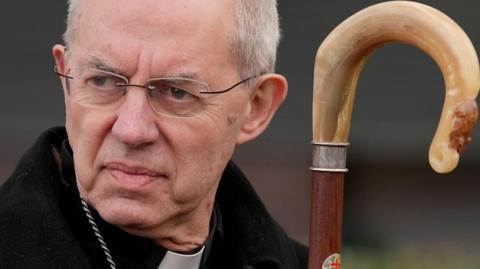Early in his tenure as Archbishop of Canterbury, he was credited with helping usher through the vote that allowed women to become bishops, being supportive of the move through often tempestuous division.
On the question of sexuality and same-sex unions, Mr Welby has had a complicated journey - shifting from a very conservative position to one where he was supportive of the measure that was eventually voted through to allow the blessing of same sex unions.
But observers saw it as a bit of a fudge by the Church and by Mr Welby.
Debate did not start with the premise that gay people were equals in the Church and deserved marriage equality (something that was not even put to a vote), and the result did not represent a significant change in Church teaching.
But neither did Church leaders condemn gay unions as some traditionalists had wanted. There was even later clarification to African Churches that the blessing prayers that were voted through were to bless the individuals in the same-sex union and not bless the union itself.
It has been a theme that in being so focused on holding things together, and sometimes appearing to try to be all things to all people, Mr Welby has been viewed by many on both right and left as not taking a principled stand.
He has behaved like a politician and in some ways has faced the downfall of a politician or executive, rather than that of spiritual leader.
What some Anglicans are calling for now is more of a theologian to lead the Church rather than someone seen more of an executive, but in a modern world with modern responsibilities, others worry that there needs to be an element of the executive leader that is needed.
The tribalism and polarisation that is often evident in the Church makes some anxious that a skilled politician at the top is the only way the institution does not start to fracture.
Whatever skill set Archbishop Welby may have had, in not doing enough on the important issue of safeguarding through rigorously pursuing abuse cases when they were brought to his attention and ensuring others did the same, much trust in the Church was lost.
Dealing decisively with that one crucial issue might well have helped in his mission to build unity and in helping stem a decline in the numbers of faithful.
